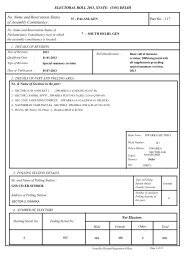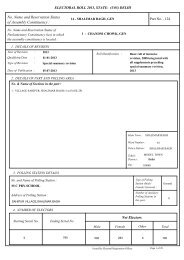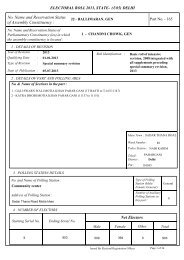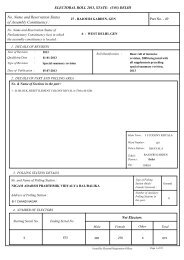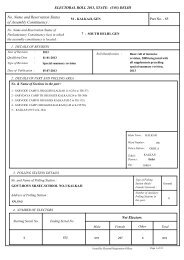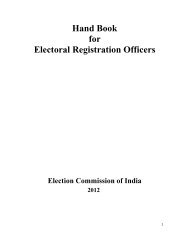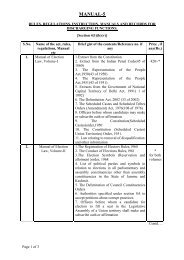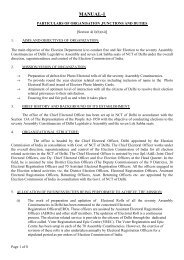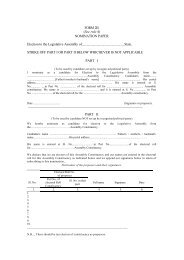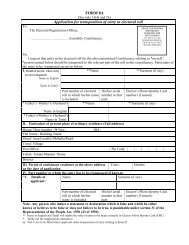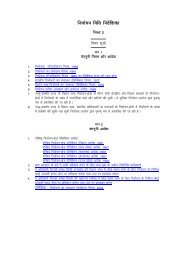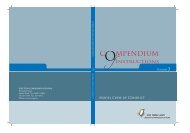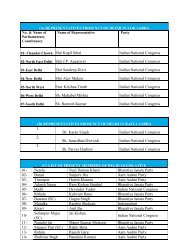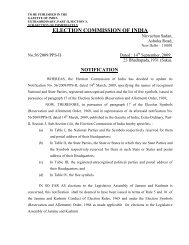handbook for presiding officers - Chief Electoral Officer, Govt. of Sikkim
handbook for presiding officers - Chief Electoral Officer, Govt. of Sikkim
handbook for presiding officers - Chief Electoral Officer, Govt. of Sikkim
You also want an ePaper? Increase the reach of your titles
YUMPU automatically turns print PDFs into web optimized ePapers that Google loves.
4. Challenging a voter’s identity<br />
Every person, whose name is entered in the electoral Roll and is able to pro<strong>of</strong><br />
<strong>of</strong> his identity, is entitled to vote at the election. Unless, there is a challenge by<br />
a candidate or his election or polling agents, or unless you are clearly satisfied<br />
that he is a bogus voter, it should normally be presumed that the person<br />
claiming to be a voter and giving out the name and other details correctly and<br />
proving his identity with the help <strong>of</strong> identification documents is that voter. If<br />
there is a challenge or if you feel any reasonable doubt about the identity <strong>of</strong><br />
the person from the surrounding circumstances, you should hold a summary<br />
inquiry and decide the question.<br />
5. Challenge fee<br />
You should not entertain any challenge to a voter’s identity by a candidate or<br />
his election/polling agent until the challenger pays two rupees in cash. After<br />
the amount has been paid, furnish a receipt there<strong>for</strong> to the challenger in the<br />
Form prescribed in Annexure VIII. Warn the person challenged about the<br />
penalty <strong>for</strong> personation, read out the relevant entry in the electoral roll in full<br />
and ask him whether he is the person referred to in that entry, enter his name<br />
and address in the list <strong>of</strong> Challenged Votes (Form 14) and ask him to sign or<br />
affix his thumb impression there<strong>of</strong>. If he refuses to do so, do not allow him to<br />
vote.<br />
6. Summary inquiry<br />
. First ask the challenger to produce evidence to show that the person<br />
challenged is not the elector that he claims to be. If the challenger fails to<br />
adduce prima facie evidence in support <strong>of</strong> his challenge, disallow the<br />
challenge and allow the person challenged to vote. If the challenger succeeds<br />
in making out a prima-facie case that the person is not the voter in question,<br />
you should call upon the latter to produce evidence to rebut the challenge i.e.<br />
to prove that he is the voter he claims to be. If he proves his claim by such<br />
evidence, allow him to vote. If he fails to do so, hold that the challenge has<br />
been established. In the course <strong>of</strong> the inquiry, you are free to ascertain the<br />
true fact from the village <strong>of</strong>ficer, the neighbours <strong>of</strong> the elector in question and<br />
any other person present at the polling station. While taking evidence, you<br />
may administer an oath to the person challenged or any other person <strong>of</strong>fering<br />
to give evidence. In case the challenge has been established, you should<br />
hand over the person to the policeman on duty, together with your complaint,<br />
as in Annexure IX, addressed to the Station House <strong>Officer</strong> <strong>of</strong> Police Station in<br />
the jurisdiction <strong>of</strong> which your polling station falls.<br />
7. Return or <strong>for</strong>feiture <strong>of</strong> challenge fee<br />
Immediately after the inquiry is over return the challenge fee <strong>of</strong> two rupees to<br />
the person, who made the challenge, after taking his receipt in Column 10 <strong>of</strong><br />
Form 14 – “LIST OF CHALLENGED VOTES” and on the counterfoil <strong>of</strong> the<br />
relevant receipt in the receipt book, in every case, except where you are <strong>of</strong><br />
the opinion that the challenge was frivolous or was not made in good faith. In<br />
the latter case, <strong>for</strong>feit the challenge fee to Government and do not return it to<br />
the challenger and enter the word “<strong>for</strong>feited” in Column 10 <strong>of</strong> Form 14 and the<br />
relevant counterfoil in the receipt book, instead <strong>of</strong> taking the depositor’s<br />
signature or thumb impression.



